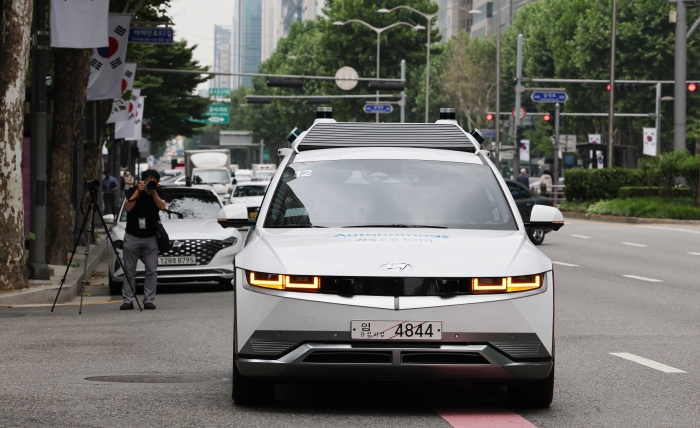
Hyundai Autoever Corp. test drives Hyundai Motor's autonomous vehicle RoboRide in southern Seoul on June 9 South Korea has embarked on a public-private project to bolster communication security for autonomous driving, for which a domestic startup will play a leading role, according to the industry sources on Wednesday.CIOT, a vehicle security startup, was recently chosen by the Ministry of Science and ICT as the lead manager of the project aimed at developing assessment technology for vehicle-to-everything (V2X) communication networks and setting standards for test driving autonomous cars.As the lead manager, CIOT will receive a total of 5.4 billion won ($4.3 million) funding from the Autonomous Driving Development Innovation Foundation (KADIF) through 2025 to set standards on V2X communication security.It is rare for a startup to lead a government-public project, which is the 12th R&D task launched by the KADIF, a government institution.The project is part of the South Korean government's push to become the first country in the world to commercialize Level 4 Plus self-driving service by 2027. Level 4 Plus autonomous vehicles can respond to traffic hand signals and drive on unpaved roads without human intervention.Currently, South Korea’s autonomous driving technology stands at Level 2, which enables advanced driving assistance systems to take over steering, acceleration and braking in specific scenarios. But drivers must remain alert for Level 2 autonomous driving. V2X refers to communication between a vehicle and any entity that may affect or be affected by a vehicle. It is regarded as a basic technology for autonomous driving and supplements the shortcomings of sensors such as radar, light detection and ranging (Lidar) and cameras.On Thursday, Minister of Land, Infrastructure and Transport Won Hee-ryong and Seoul Mayor Oh Se-hoon became the first passengers of an autonomous vehicle in South Korea during a trial ride. Seoul Mayor Oh Se-hoon rides in an autonomous car on June 9
CIOT, founded in 2015, specializes in security services for electric vehicles and driverless cars. It is backed by two Seoul-based investment firms -- Hyundai Investment Partners and Dongmoon Partners.In July 2021, CIOT signed a hardware module supply contract with a component supplier of Hyundai Motor Co. and Kia Corp. Hyundai is expected to adopt CIOT’s security technology for its iconic all-electric crossover IONIQ 5.“V2X technology can resolve the limited visual field problem with the radar and LiDAR, which serve as the eyes of autonomous vehicles,” said a security service company.“But its real-time, multipoint communication makes it vulnerable to hacking and data breaches, so higher-level security is required.” Other participants in the project include the Telecommunications Technology Association, South Korea’s research institution; the Korea Automotive Technology Institute; Hansung University in South Korea; Essys Co., a South Korean automotive components maker; and Bluetech, a communication equipment maker.Separately, the Ministry of Land, Infrastructure and Transport has been working on the evaluation system for software embedded in the interior space of autonomous vehicles jointly with the state-run Korea Transportation Safety Authority since last year.Amid concerns about automotive security, the European Commission will assess the cybersecurity management system (CSMS) of the interior of cars and hold their manufacturers responsible for any defect in the system from next month.By See-Eun Leeseeker@hankyung.comYeonhee Kim edited this article.